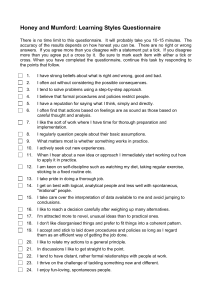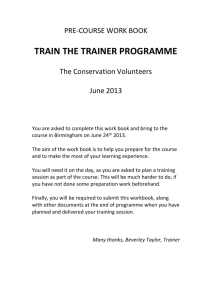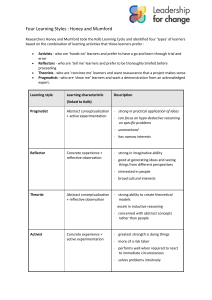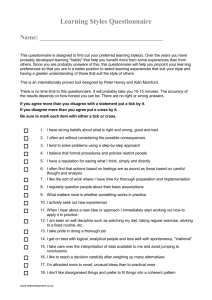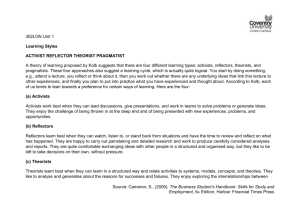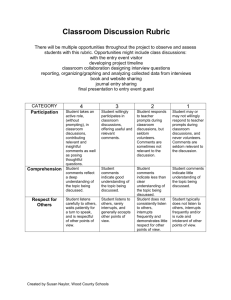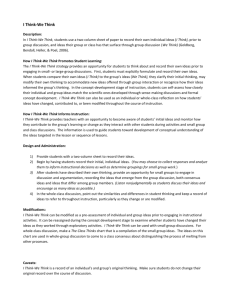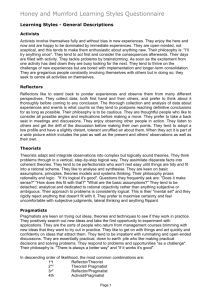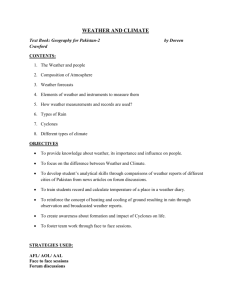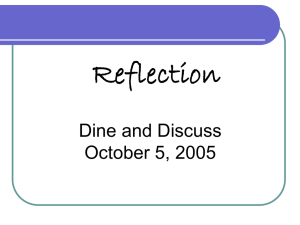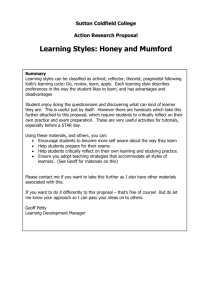Honey-and-Mumford-Le..
advertisement
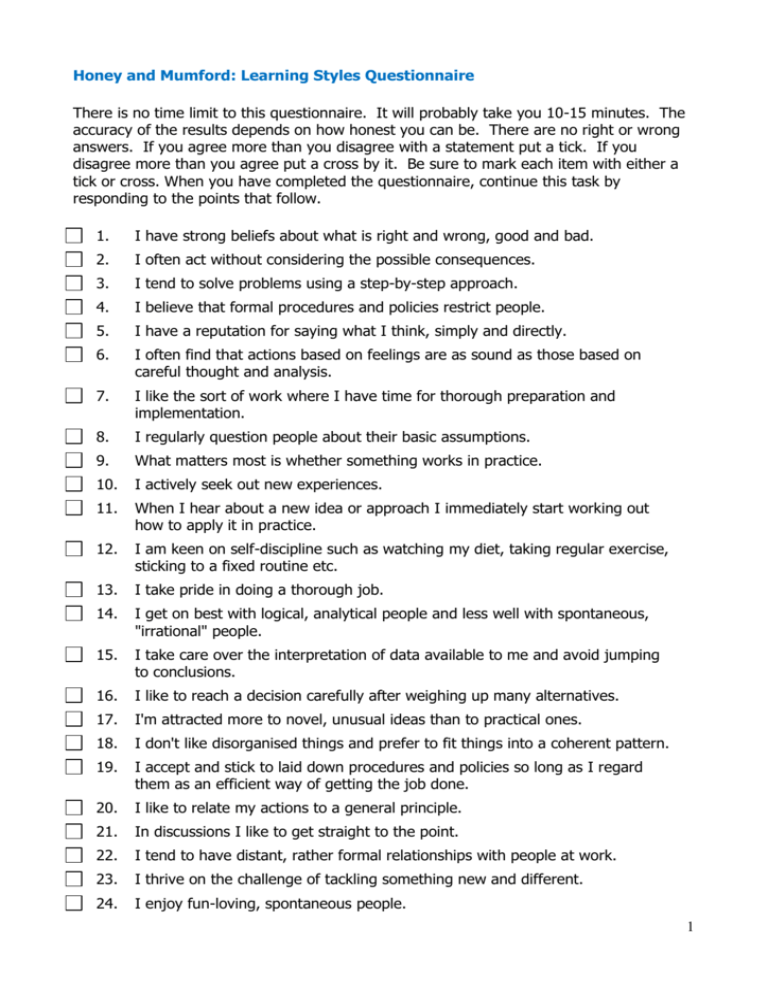
Honey and Mumford: Learning Styles Questionnaire There is no time limit to this questionnaire. It will probably take you 10-15 minutes. The accuracy of the results depends on how honest you can be. There are no right or wrong answers. If you agree more than you disagree with a statement put a tick. If you disagree more than you agree put a cross by it. Be sure to mark each item with either a tick or cross. When you have completed the questionnaire, continue this task by responding to the points that follow. 1. I have strong beliefs about what is right and wrong, good and bad. 2. I often act without considering the possible consequences. 3. I tend to solve problems using a step-by-step approach. 4. I believe that formal procedures and policies restrict people. 5. I have a reputation for saying what I think, simply and directly. 6. I often find that actions based on feelings are as sound as those based on careful thought and analysis. 7. I like the sort of work where I have time for thorough preparation and implementation. 8. I regularly question people about their basic assumptions. 9. What matters most is whether something works in practice. 10. I actively seek out new experiences. 11. When I hear about a new idea or approach I immediately start working out how to apply it in practice. 12. I am keen on self-discipline such as watching my diet, taking regular exercise, sticking to a fixed routine etc. 13. I take pride in doing a thorough job. 14. I get on best with logical, analytical people and less well with spontaneous, "irrational" people. 15. I take care over the interpretation of data available to me and avoid jumping to conclusions. 16. I like to reach a decision carefully after weighing up many alternatives. 17. I'm attracted more to novel, unusual ideas than to practical ones. 18. I don't like disorganised things and prefer to fit things into a coherent pattern. 19. I accept and stick to laid down procedures and policies so long as I regard them as an efficient way of getting the job done. 20. I like to relate my actions to a general principle. 21. In discussions I like to get straight to the point. 22. I tend to have distant, rather formal relationships with people at work. 23. I thrive on the challenge of tackling something new and different. 24. I enjoy fun-loving, spontaneous people. 1 25. I pay meticulous attention to detail before coming to a conclusion. 26. I find it difficult to produce ideas on impulse. 27. I believe in coming to the point immediately. 28. I am careful not to jump to conclusions too quickly. 29. I prefer to have as many sources of information as possible -the more data to mull over the better. 30. Flippant people who don't take things seriously enough usually irritate me. 31. I listen to other people's point of view before putting my own forward. 32. I tend to be open about how I'm feeling. 33. In discussions I enjoy watching the manoeuvrings of the other participants. 34. I prefer to respond to events on a spontaneous, flexible basis rather than plan things out in advance. 35. I tend to be attracted to techniques such as network analysis, flow charts, branching programmes, contingency planning, etc. 36. It worries me if I have to rush out a piece of work to meet a tight deadline. 37. I tend to judge people's ideas on their practical merits. 38. Quiet, thoughtful people tend to make me feel uneasy. 39. I often get irritated by people who want to rush things. 40. It is more important to enjoy the present moment than to think about the past or future. 41. I think that decisions based on a thorough analysis of all the information are sounder than those based on intuition. 42. I tend to be a perfectionist. 43. In discussions I usually produce lots of spontaneous ideas. 44. In meetings I put forward practical realistic ideas. 45. More often than not, rules are there to be broken. 46. I prefer to stand back from a situation and consider all the perspectives. 47. I can often see inconsistencies and weaknesses in other people's arguments. 48. On balance I talk more than I listen. 49. I can often see better, more practical ways to get things done. 50. I think written reports should be short and to the point. 51. I believe that rational, logical thinking should win the day. 52. I tend to discuss specific things with people rather than engaging in social discussion. 53. I like people who approach things realistically rather than theoretically. 2 54. In discussions I get impatient with irrelevancies and digressions. 55. If I have a report to write I tend to produce lots of drafts before settling on the final version. 56. I am keen to try things out to see if they work in practice. 57. I am keen to reach answers via a logical approach. 58. I enjoy being the one that talks a lot. 59. In discussions I often find I am the realist, keeping people to the point and avoiding wild speculations. 60. I like to ponder many alternatives before making up my mind. 61. In discussions with people I often find I am the most dispassionate and objective. 62. In discussions I'm more likely to adopt a "low profile" than to take the lead and do most of the talking. 63. I like to be able to relate current actions to a longer-term bigger picture. 64. When things go wrong I am happy to shrug it off and "put it down to experience". 65. I tend to reject wild, spontaneous ideas as being impractical. 66. It's best to think carefully before taking action. 67. On balance I do the listening rather than the talking. 68. I tend to be tough on people who find it difficult to adopt a logical approach. 69. Most times I believe the end justifies the means. 70. I don't mind hurting people's feelings so long as the job gets done. 71. I find the formality of having specific objectives and plans stifling. 72. I'm usually one of the people who puts life into a party. 73. I do whatever is expedient to get the job done. 74. I quickly get bored with methodical, detailed work. 75. I am keen on exploring the basic assumptions, principles and theories underpinning things and events. 76. I'm always interested to find out what people think. 77. I like meetings to be run on methodical lines, sticking to laid down agenda, etc. 78. I steer clear of subjective or ambiguous topics. 79. I enjoy the drama and excitement of a crisis situation. 80. People often find me insensitive to their feelings. 3 Scoring You score one point for each item you ticked. There are no points for crossed items. Circle the questions you ticked on the list below: 2 7 1 5 4 13 3 9 6 15 8 11 10 16 12 19 17 25 14 21 23 28 18 27 24 29 20 35 32 31 22 37 34 33 26 44 38 36 30 49 40 39 42 50 43 41 47 53 45 46 51 54 48 52 57 56 58 55 61 59 64 60 63 65 71 62 68 69 72 66 75 70 74 67 77 73 79 76 78 80 Activist Reflector Theorist Pragmatist ToTotals 4 Plot the scores on the arms of the cross below: 20 Activist 15 10 5 Pragmatist 0 -20 -15 -10 -5 0 -5 5 10 15 20 Reflector -10 Theorist -15 -20 Your result may show that you have a particular learning style. It may be useful to bear this in mind as you approach tasks. Was the approach you adopted the best one in the circumstances? Would adopting another learning style have improved you performance? At this point you may also find it helpful to read through Characteristics of the Four Learning Styles, which follow. This provides more detail and should help you clarify your sense of your own preferred style(s). 5 CHARACTERISTICS OF THE FOUR LEARNING STYLES (Sources: Learning Styles. FEDA, Honey & Mumford, The Manual of Learning Styles. ) ACTIVISTS Doing things STRENGTHS Looking at situations from various perspectives and grasping the big picture PRAGMATISTS THEORISTS Practical application of ideas Creating theoretical models Integrating theory and practice Thoroughness Industriousness Flexibility Decision making in organisations Acting quickly Getting things done Developing and working with systems More interested in people (how they behave and how they feel) than in structures More interested in structural aspects of situations than in people. Dealing with ideas To get involved directly and then reflect on the experience "Hands On" experience To know the experts' views New experiences Taking risks Getting involved in activities with people Getting things done CONCERNED ABOUT Collection of data from variety of sources Putting ideas into action Enjoy change and variety PREFERENCES REFLECTORS Verbal skills Solving problems To work alone More concerned with processes than outcomes Personal relevance Personal meaning Doing what interests them The feelings of others Maintaining wide ranging interests Testing things out to get correct solution Details Quality of information Practical application of what they learn Accuracy of facts Personal effectiveness Harmony Intellectual ability 6 PREFERRED WAY OF LEARNING AND WORKING ACTIVISTS REFLECTORS Self discovery, trial and error learning Learning by listening and sharing ideas with others Strong need to work on practical, relevant problems Enjoy being taught in a didactic way Learning by doing Group work and discussions To use skills and tinker with things Prefer to work individually rather than in groups Flexible approaches to learning Looking for meaning Test theories and apply common sense Like to have access to a lot of information/resources Collecting data Bringing unity to diversity Looking at information in a logical way, and then act on it immediately Standing back from events and observing what happens Workshop and laboratory teaching methods To specialise Not worried about getting it wrong Can work well with others Researching and reviewing Thinking before doing Likes attention, chairing meeting, leading discussions etc. More concerned with doing than thinking and feeling Likes to get stuck in without wasting time PRAGMATISTS To solve problems To reason deductively when focusing on specific problems Making instinctive judgements based on practicality Clear goals and adequate rewards THEORISTS Enjoy reading Planning organising work Thinking things through Reworking notes/essays to achieve best results Make links between ideas Examining information carefully Critically evaluating information Thinking sequentially Deductive reasoning 7 DISADVANTAGES ACTIVISTS Doing too many things at once REFLECTORS Easily distracted PRAGMATISTS Lack of patience with people's suggestions Lack of planning Waste too much time before getting started Wanting to do everything their way Poor time management, leaving things to last minute Frustrated by action plans Lack of imagination Can be too easy going Poor presentation Sometimes indecisive Details can get in the way Can forget important details Inability to consider alternatives Tend to work in bursts of energy Intolerance to woolly ideas Lack of attention to detail Not checking/testi ng things out Jumping in too quickly and not thinking things through Being too pushy at times Giving insufficient consideration to alternative ways of doing things Inability to stand back and allow others to take action Inability to act spontaneously Only doing what is perceived as directly relevant to a given task Need to be in control and to do it alone Not interested in concepts or theories THEORISTS Need a lot of information before starting work Reluctant to try anything new Like to do things in a set way Get bogged down in theory Don't trust feelings but rely on logic Overcautious; don't take risks Heavily reliant on expert opinion without considering other views Uncomfortable in group work May have difficulty understanding emotions and feelings 8
